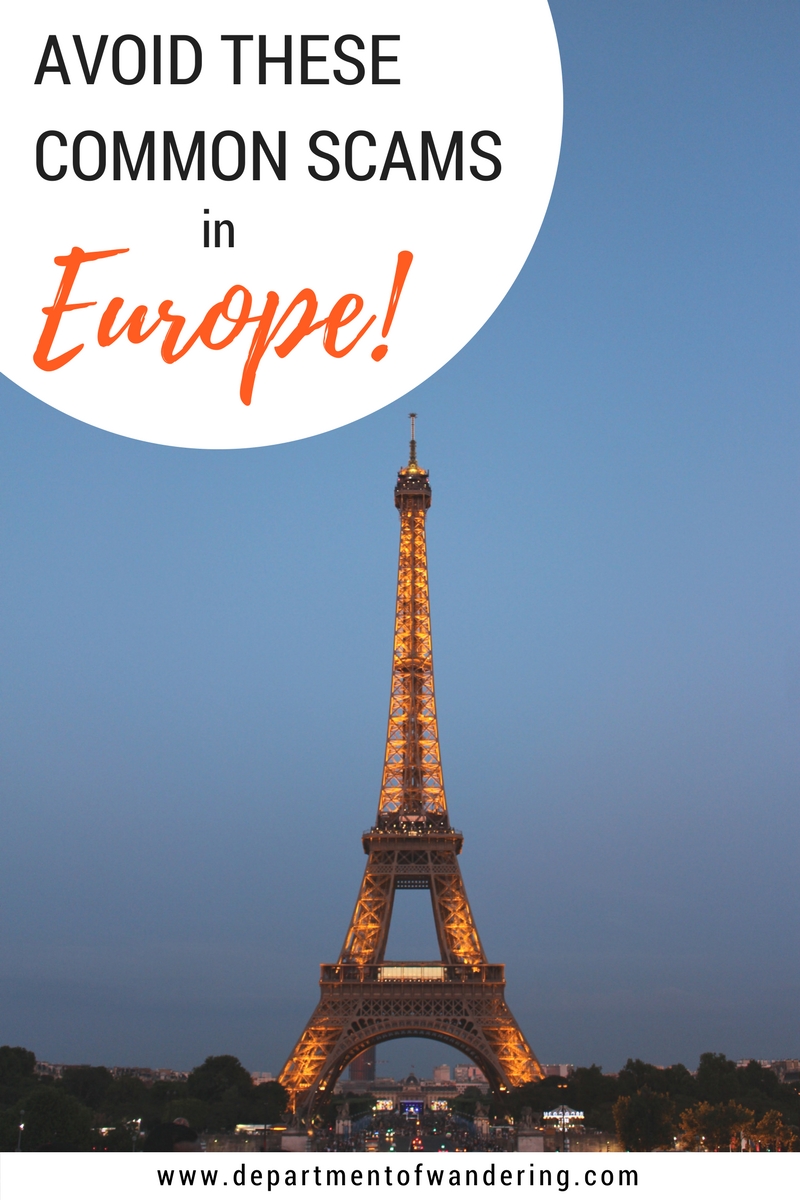
A trip around Europe is a right of passage for almost everyone nowadays, not just young backpackers anymore. Whether you come for its layered history, its scenic beauty or in search of its culinary temptations, Europe is one jam-packed destination that has got it all. It’s no wonder that millions upon millions of tourists flock to the continent every single year.
It’s an unfortunate reality, however, that some of Europe’s disadvantaged people target unsuspecting tourists with scams. To these people, tourists are seen as having big, flashing dollar signs above their heads, especially those touting around expensive cameras or iPhones on selfie sticks. Unsuspecting tourists are commonly taken advantage of and those who haven’t had much experience with scammers often fall victim. The scams below are all very common throughout Europe and I’ve seen many an opportunistic scammer in action during my years spent living there. Whilst it’s certainly no reason to be paranoid, it does help to pay attention to your surroundings and realise when someone might be trying to take advantage of you. If you’re planning a big trip soon, read up on these common scams in Europe before you go!
Avoid these common scams in Europe!
The clipboard petition scam
A woman who is holding a clipboard will approach you and ask, ‘Do you speak English?’. On the clipboard she has what looks to be a petition to help the disabled. Her aim is to get you to stop, say yes and engage you in a dialogue. She’ll be working in a group, so even if she appears alone, there are others nearby watching. You’ll listen to her, perhaps even sign the document and walk away. Later, you’ll notice your wallet is missing – sneakily lifted by one of the others working alongside her.
The rose scam
A man will approach with a big bunch of roses and will try to offer you one. If you accept, you’ll be asked to pay an exorbitant price, such as €20. If you decline and try to give back the rose, the scammer won’t take it back it and will continue to pester you for money, making a scene and following you until you pay up.

The taxi meter scam
This scam tends to occur in some of the poorer European countries. Jumping in a taxi, you’ll tell the driver where you want to go and get on your merry way. Soon after, you’ll notice that the meter isn’t ticking up – it’s not on at all. You’ll ask the driver to turn it on but he’ll tell you that it’s broken. Upon arriving to your destination, you’ll be charged a hefty price – sometimes double or triple what it should have been – but you really have no choice but to pay up at this point. Always insist they use the meter before you head off.
The public transport ticket scam
When attempting to buy public transport tickets, you might see someone hanging around the ticket machine. As you go to use it, they will either try to ‘help’ you buy a ticket or try to offer you one of their tickets at a reduced price. Always refuse to engage in conversation with these people. They’re not trying to help you at all, but trying to rip you off. If you allow them to help you buy a ticket, they will commonly purchase a reduced fare ticket for you and pocket your change, leaving you with a ticket that is not valid and could land you in trouble if it was checked by an official. Similarly, by giving them money in exchange for an old ticket of theirs, you don’t have to be a rocket scientist to realise that the ticket is probably expired or invalid.
The bracelet scam
This scam might appear cute at the beginning, but the intentions are far from friendly. You’ll be approached and offered a ‘friendship bracelet’. Your hand will be quickly grasped and the bracelet will be tied tight around your wrist. It will be impossible to remove so even if you wanted to refuse and return it, you can’t. You’ll then be asked for money, since you ‘bought’ the bracelet. If you try to walk away, you’ll be followed and persistently hounded for the money, often €20. Sometimes, while you’re distracted with the bracelet situation, your wallet will be pickpocketed by another accomplice.

The street vendor scam
Notice those guys selling selfie sticks, bags and knick-knacks at popular tourist sites? Be wary of them. Whilst they might look innocent enough trying to sell their items, not all of them are. As you’re distracted by them, another scammer working alongside might try and relieve you of your valuables.
The ATM swipe scam
Always choose your ATM carefully. Although it can be really hard to tell, some standalone ATMs have skimming devices installed that capture your card information. The safest and most secure places to withdraw cash abroad are at the ATMs at major banks. These are much less likely to be dodgy.
The clumsy pickpocketer scam
This scam occurs when someone ‘accidentally’ bumps into you. While it might seem harmless at first, later on you might realise your wallet or phone is missing. Although this scam can be difficult to anticipate, always be aware of where your valuables are at all times. Keep them close to you, especially in busy areas.
Planning a trip to Europe soon and keen to read some more tips? You might like:
- How to Survive a Long Haul Flight in 25 Tips
- Jet Lag: 9 Things You’re Doing Completely Wrong
- The Best Free Things to do in Rome
Like this post? Pin it for later!





Seems like scammers in Europe are pretty aggressive. Thanks for sharing this, Rachel!
They can be Therie! As long as you’re aware of what they’re up to, it shouldn’t be the cause of too much stress though. Just keep your belongings in a safe place 😉